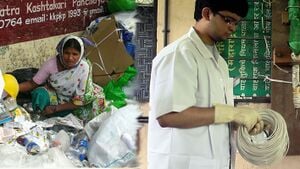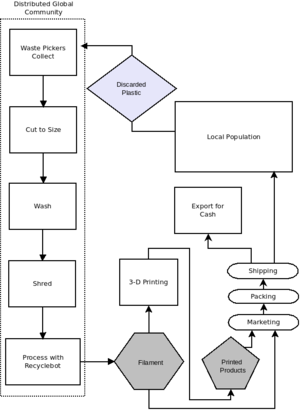
Following the rapid rise of distributed additive manufacturing with 3-D printing has come the technical development of filament extruders and recyclebots, which can turn both virgin polymer pellets and post-consumer shredded plastic into 3-D filament. Similar to the solutions proposed for other forms of ethical manufacturing, it is possible to consider a form of ethical 3-D printer filament distribution being developed. There is a market opportunity for producing this ethical 3-D printer filament, which is addressed in this paper by developing an "ethical product standard" for 3-D filament based upon a combination of existing fair-trade standards and technical and life cycle analysis of recycled filament production and 3-D printing manufacturing. These standards apply to businesses that can enable the economic development of waste pickers and include i) minimum pricing, ii) fair trade premium, iii) labor standards, iv) environmental and technical standards, v) health and safety standards, and vi) social standards including those that cover discrimination, harassment, freedom of association, collective bargaining and discipline.
Major Organizations[edit | edit source]

First Example[edit | edit source]
- Protoprint in India had the first fair trade filament for sale [1]
See also[edit | edit source]
| ProtoPrint |
|---|
|
ProtoPrint employees waste pickers in India to use a FlakerBot and RefilBot that make HDPE waste into filament |
- RepRapable Recyclebot: Open source 3-D printable extruder for converting plastic to 3-D printing filament
- Tightening the loop on the circular economy: Coupled distributed recycling and manufacturing with recyclebot and RepRap 3-D printing
- Wood Furniture Waste-Based Recycled 3-D Printing Filament
- Fair trade standards
- Recyclebot
- Energy Payback Time of a Solar Photovoltaic Powered Waste Plastic Recyclebot System
- Life cycle analysis of distributed recycling of post-consumer high density polyethylene for 3-D printing filament
- Mechanical Properties of Components Fabricated with Open-Source 3-D Printers Under Realistic Environmental Conditions
- Mechanical testing of polymer components made with the RepRap 3-D printer
- Development and feasibility of applications for the RepRap 3-D printer
- Life cycle analysis of distributed polymer recycling
- Solar powered distributed customized manufacturing
- Distributed recycling of post-consumer plastic waste in rural areas
- LDPE recycling on a bike with a RepRap from Taipei-based company Fabraft
- Plastic Bank
- Plastic Bank Extruder v1.0
- Open-source, self-replicating 3-D printer factory for small-business manufacturing
- Global value chains from a 3D printing perspective
- Expanding the Consumer Bill of Rights for material ingredients
- Fused Particle Fabrication 3-D Printing: Recycled Materials' Optimization and Mechanical Properties
- 3-D Printable Polymer Pelletizer Chopper for Fused Granular Fabrication-Based Additive Manufacturing
- Green Fab Lab Applications of Large-Area Waste Polymer-based Additive Manufacturing
- Systems Analysis for PET and Olefin Polymers in a Circular Economy
In the News[edit | edit source]
- Ethical Filament: Can Fair Trade Plastic Save People and the Planet? - Michigan Tech News, Lab Manager
- Ethical filament: Can fair trade plastic save people and the planet? - Science Daily
- Can fair trade plastic save people and the planet?- Phys.org
- Setting the Standard: ethical filament standards evaluation - The Ethical Filament Foundation
- Fair trade 3D printing filament protects people and the planet - Global Environmental Society
- Fair Trade Filament for 3D Printing, Here We Come! - 3D Printing Industry
- 3D printing at home could be a green and socially responsible choice - Drupa News Room
- Turning trash into treasure - The Lode
- Fair-trade plastic for 3D printers - Frontiers in Ecology and the Environment
- Shane Taylor's Top 5 3D Printing Applications for 2014 - 3D Printing Industry


